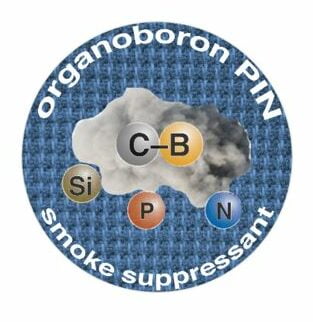
DTNW Germany has launched research into organoboron compounds as safer alternative smoke suppressant PIN FRs for the automotive and construction sectors. Boric acid and its salts are very effective FRs in terms of fire resistance and smoke suppression, acting by facilitating charring and glass formation. However, boric acid is a substance of very high concern (SVHC) under REACH. In order to develop a safer alternative solution to provide boron’s smoke suppressing effect, DTNW (Deutsches Textilforschungszentrum Nord-West GmbH) and Hochschule Bremen are developing non-halogenated boronate-based or boronate-PIN combined textile FRs for biobased composite materials, using organoboron compounds (not concerned by the SVHC designation). The chemical immobilisation of the organoboron FRs on the textile fibres and the implementation of finished textiles into composite materials (embedded in a polymer matrix), are expected to mean very low potential environmental exposure. Toxicity of combustion gases will be monitored and evaluated via gas phase analyses (TGA/MS, TGA/IR) and a beneficial effect on overall toxicity is anticipated.
The project is financed within the AiF funding (IGF No. 21318 N) of the German government. It will pay special attention towards the applicability of the developed FR mixtures for small and medium-sized enterprises (SME) in textile finishing.
http://www.dtnw.de/forschungsvorhaben/aktuelle-forschungsvorhaben/borhaltige-flammschutzmittel/
https://igf.aif.de/innovationsfoerderung/industrielle-gemeinschaftsforschung/igf-steckbrief.php?id=24375&suchtext=21318%20N